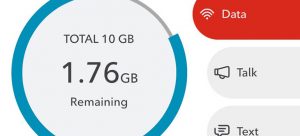Shopping around for a new smartphone and/or service plan, you’ve probably come across the terminology “endless data” and wondered what on earth it actually means. Surely, these carriers aren’t offering you limitless data such that you could binge several Netflix movies per day from your phone using wireless data, stream music during your one-hour commutes to and from the office, and navigate your every move, every day, while never paying any overage fees?
 Well, in some cases, endless data does indeed mean just that. But with a clever catch.
Well, in some cases, endless data does indeed mean just that. But with a clever catch.
What’sThe Catch?
The catch is that while you can theoretically continue to use data long after the allotted amount in your plan has been reached, it will be throttled. This means that your device will switch to a slower speed. So you can still surf the web, stream content, send e-mails, and so on. But you may be taken back to the early ‘00s when it took 20 minutes to download a single song, or half a minute to load a Webpage. You might watch a spinning wheel or a loading progress bar as the message tries to send or web page tries to load.
It might not sound like a big deal, especially to those who experienced the much slower Internet way back when. But with the lighting fast Internet speeds we enjoy today, it might be tough to fathom having to actually wait any time at all for a web page to load (why isn’t it just popping up?), or watching a video and see it (yelp) buffer every few minutes.
That said, you are still getting to access your data long after you exceed the limit you agreed to adhere by, so perhaps the tradeoff as an “in case of emergency option” is worth it. You aren’t really paying more for these plans than you would with others, after all.
What “Endless Data” Plans Are Available?
Telus recently launched its Peace of Mind rate plans for Bring Your Own Device (BYOD) customers touting “endless data.” They start at $75/mo. for 10GB of high-speed data. If you go over the 10 gigs, you can continue to use your data at the lower 512Kbps speed until the new month kicks in and you go back to your ultra-fast speeds.
Bell’s Unlimited 10 plan is virtually identical: $75/mo., and 512Kbps speeds once you exceed 10GBs of data, but they also offer an Unlimited 20 plan that is $95/mo. for 20GB of data and an Unlimited 50 plan for 50GB of data per month at $125. In all cases, speeds are throttled to 512Kbps after you exceed the data allotment, which Bell says is “suitable for light web browsing, e-mail, and messaging.”
Rogers has also gotten on board with its Rogers Infinite plans, which come in +10, +20, and +50 options, just like Bell, with 10GB ($75/mo.), 20GB ($95/mo.), and 50GB ($125/mo.), respectively. Rogers only notes that you’ll get a “reduced speed” after reaching the maximum, but doesn’t specify what that speed is, only noting that it is a speed for “basic e-mail, browsing, texting and apps.”
Is It Worth It?
If you’re in a pinch, having the option to still access data without worry that you’ll have to pay an extra $10 per gigabyte or some other exorbitant fee, can be a huge relief. It offers, as Telus notes, great peace of mind. If you’re stuck somewhere and need to hail an Uber, for example, or need to access directions to a destination, always having access to data could be a lifesaver.
But, as anyone who has tried to log on to slow, bogged-downed public Wi-Fi networks has experienced, sometimes it isn’t even worth trying to use data when you’re on a network connection that isn’t up to par. If it takes two minutes to open a web page, or post a video to Facebook, is it really worth it? Sometimes the experience on slower-speed networks can be more frustrating than it is useful.
In the end, the concept of endless data is great, because there is some truth to it. You’re paying for a certain amount of data each month, as you always did. But now, you have the option whereby you can continue to access it even if you have a high-usage month.
As long as customers still have the option to pay overage fees if they want to buy more high-speed data for the month, the plan is a win-win. But don’t expect to be binge-watching entire series, streaming music, or playing Candy Crush from your smartphone for hours on end after you’ve exceeded your data limit. Endless data will be great for sending an e-mail or two, instant messaging, and maybe surfing a few websites or using some apps that don’t require a ton of data. But it isn’t endless in the sense that you can expect to use your phone the same way you did for the first 10, 25, or 50GB worth of data you went through.
Related: Check out our other articles on Data and Smartphone



